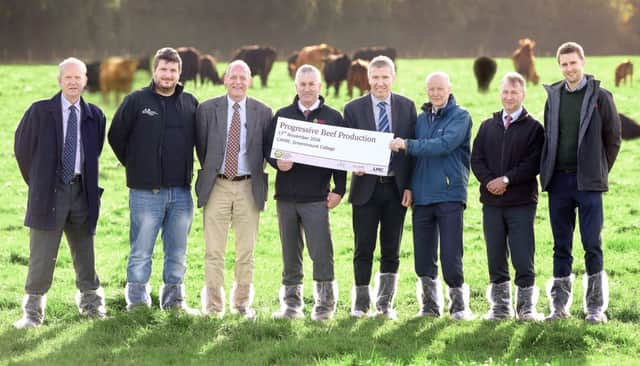Top line-up for Progressive Beef Production Conference 2016


Progress with beef production is the focus of the conference, with speakers from both practical farming and research backgrounds. The conference is open to all with an interest in beef production. The fee is £20 and bookings are encouraged online at _www.ufuni.org
Bookings can also be made with Angela Scott at UFU HQ on 028 9037 0222. Those involved in beef business development groups will be able to use the conference as a qualifier meeting and should have their group number available when booking. Spaces are limited and offered on a first come first serve basis so advanced booking will be essential.
Programme
09:30 – 10:15 - Registration
Advertisement
Hide AdAdvertisement
Hide Ad10:15 – 10:25 - Welcome (Ulster Farmers’ Union President, Barclay Bell)
Morning session Chairperson: James Campbell, IFJ
10:30 – 10:50 - Achieving top 1% performance with suckled calf production
Simon Marsh, Harper Adams University – Simon grew up on a Lancashire family farm and has been heavily involved in beef research throughout his career. He is currently a Principal Lecturer at Harper Adams University and is also a National Beef Association board member and one of the judges of the Farmers Weekly beef farmer of the year awards.
10:50 – 11:10 - Improving soil fertility to drive grassland production
Advertisement
Hide AdAdvertisement
Hide AdNorman Weatherup, CAFRE - Norman joined CAFRE in 1999 and has held a range of posts including Business Technologist, Student Learning Project Coordinator for Red Meat, Development Advisor and is currently the Senior Beef, Sheep and Grassland Technologist.
11:10 – 11:30 - Sustainable suckler cow production
Robert Parker, farmer, Stranraer – Robert operates a 230Ha lowland beef and sheep unit. The farm runs 210 Hereford X Angus beef cows and 180 Easycare breeding ewes. He is a Nuffield scholar and has won a number of industry competitions including the Scottish grassland competition and UK Hereford Cattle Society suckler herd of the year.
11:30 – 11:45 - Comfort break
11:45 – 12:05 - Switching to dairy beef production
Kevin Farrell, farmer, Co. Longford – Kevin produces dairy beef and sheep on his 78ha farm while acting as co-ordinator for the Longford beef group and Midland lamb group. He has also been a participant in the Irish Farmers’ Journal dairy calf to beef programme, is a Council member of the Irish Grassland Association and sits on the Teagasc beef stakeholder group.
12:05 – 12:25 - Should beef producers adopt best practice from the poultry sector?
Advertisement
Hide AdAdvertisement
Hide AdTom Forgrave, farmer, Finvoy – Tom first entered the poultry sector in 1989. His farm currently has eight broiler houses, producing 1.2m birds per year for Moy Park. In the aftermath of the BSE crisis in the 1990s, Tom successfully diversified into Christmas tree production with 40 acres of woodland currently on farm. He is also the Chairman of the UFU poultry committee and the Moy Park growers group.
12:25 – 13:00 - Panel discussion
13:00 – 13:15 - Address from the Minister for the Department of Agriculture, Environment and Rural Affairs Michelle McIlveen MLA
13:15 – 14:30 - Lunch sponsored by the ABP Food Group
Afternoon session Chairperson: Justin McCarthy, IFJ
14:30 – 14:50 - Beef genomics – The Irish experience
Stephen Conroy, Irish Cattle Breeders Federation (ICBF) – Stephen manages the ICBF bull performance station at Tully, Co. Kildare. ICBF help to co-ordinate the application of science and technology in ROI to ensure that their beef farmers and industry make the most profitable and sustainable decisions through the use of the services provided from the ICBF cattle breeding database.
14:50 – 15:10 - Identifying
superior carcases through VIA and genomics
Abbygail Moran, Scotland’s Rural College (SRUC) – Abby is a geneticist at the SRUC which carries out genetic evaluations for the UK dairy, beef and sheep industries. Currently Abby is working on a project which aims to improve fertility and calf survival in the UK beef industry through the development of Genomic Estimated Breeding Values (GEBVs) and Estimated Breeding Values (EBVs). This project has built on the carcass traits project which produced the UK’s first GEBVs and EBVs for abattoir carcass traits in early 2016.
Advertisement
Hide AdAdvertisement
Hide Ad15:10 – 15:25 - Introduction to the Northern Ireland Agri-Hub
Steven Morrison, AgriSearch – Steven first began work as a research scientist at the Agri-Food and Biosciences Institute (AFBI) in the area of beef cattle before moving into nutritional and management strategies to improve the efficiency of rearing dairy youngstock. He is now Programme Leader of Sustainable Livestock Production research at AFBI and is jointly responsible for the Bovine Information System (BovIS). In February 2015, Steven was appointed by AgriSearch as Project Manager to deliver the recommendations of an independent review of livestock genetics in Northern Ireland.
15:25 – 15:35 - Introducing new genetics to the beef herd via synchronisation and AI
Francis Lively, AFBI - Francis is a Senior Scientific Officer within the Sustainable Beef Research Unit of the Agri-Food and Biosciences Institute (AFBI). He obtained his Ph.D. in Meat Science from Queen’s in 2006 after completing a degree in Agriculture. His research since then has been focused on areas of beef production covering nutrition, breeding, health and welfare, energy utilization efficiencies, production systems and meat quality. More recently he has been involved in a number of studies involving the use of synchronisation and AI throughout the beef industry.
15:35 – 16:05 - Panel Discussion
16:05 – 16:15 - Closing remarks (Justin McCarthy, Editor, IFJ).